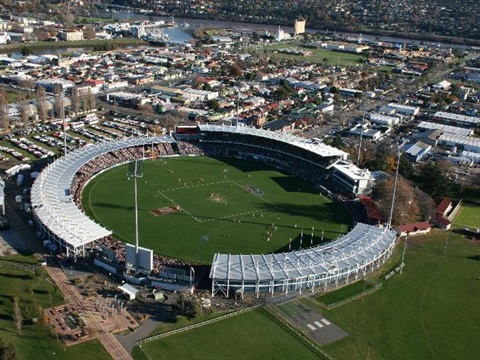Council to vote on UTAS Stadium ownership transfer
Published on 09 December 2022

The City of Launceston will formally vote on the transfer ownership of University of Tasmania Stadium at its ordinary meeting next Thursday.
At the last State election, then-Premier Peter Gutwein announced a plan to establish a statutory authority - Stadiums Tasmania - to oversee the management of Tasmania's major sporting facilities, including UTAS Stadium, the Silverdome and Blundstone Arena.
The legislation to establish the authority was passed by Parliament earlier this year.
At next week's Council meeting, Councillors will vote whether to accept the proposal to transfer ownership of UTAS Stadium to Stadiums Tasmania - a decision that could save the Council more than $3 million a year in operating costs.
Mayor Danny Gibson said if Councillors voted in the affirmative, Council will be required to open a 21-day public objection period as required by the Local Government Act before the transfer can be finalised.
"Any objections we receive during that time must be formally considered by the Councillors at a future meeting," Mayor Gibson said.
The Council will also vote to subdivide the land to remove the bowls green and associated facilities, which do not form part of the transfer to Stadiums Tasmania. The decision before council will also include the transfer of all current employees and their full entitlements.
Mayor Gibson said the proposal to transfer the Stadium to the State Government was first flagged during the development of the City of Launceston's UTAS Stadium Future Directions Plan, which was endorsed by the Council in February 2021.
"The Plan identified that UTAS Stadium was approaching a pivotal period for its future as a number of factors converged to cause the Council to reflect and review its future ownership and governance structures, together with its future development needs," Mayor Gibson said.
"Substantial future capital investment is required, which is being driven by factors such as increasing compliance requirements, increasing user expectations as well as community sport and recreation needs."
Mayor Gibson said the Council also identified that it was not appropriate to continue operating a Tier 2 Stadium with the current operational model.
"The current approach inhibits the Stadium’s ability to act commercially and be responsive and flexible in decision-making," he said. "By that, I mean it doesn't allow us the ability to operate with independence and fails to recognise that the management of major sports venues is highly specialised and distinct from the traditional roles of government and departments."
Mayor Gibson said the establishment of Stadiums Tasmania represents a move to a more contemporary and fit-for-purpose ownership and governance structure for the State's major stadiums, which have been place for major stadiums in mainland states for a number of years.
"If Council votes to approve the asset transfer to Stadiums Tasmania, it will not only result in savings to Council of between $3 million a year and up to $5 million when the average capital expenditure is taken into account, but it will also ensure that the Stadium itself remains in public hands and available events such as AFL games, Big Bash matches and any other content such as music concerts and the like," Mayor Gibson said.
"The other benefit for Launceston residents is that it mean Council will be able to reallocate those funds to other really important community projects, which I would expect to be welcomed by our ratepayers."